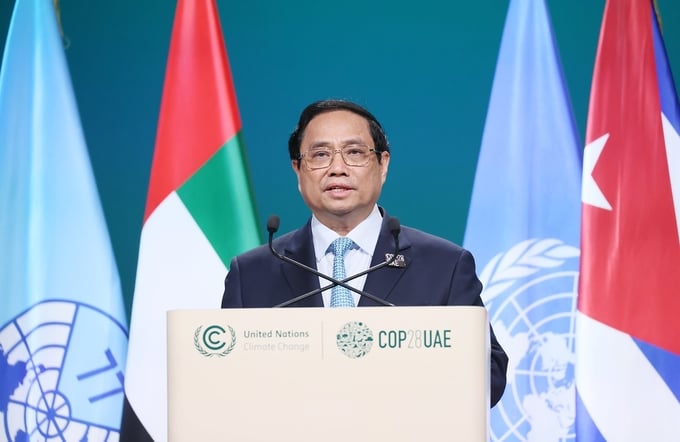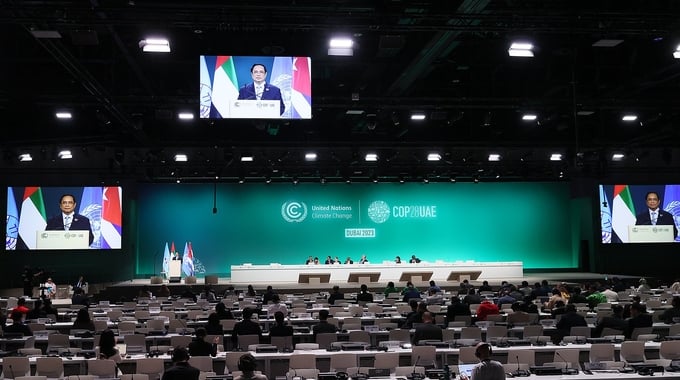November 26, 2025 | 23:40 GMT +7
November 26, 2025 | 23:40 GMT +7
Hotline: 0913.378.918
November 26, 2025 | 23:40 GMT +7
Hotline: 0913.378.918

Prime Minister Pham Minh Chinh presenting during the discussion session of the summit. Photo: VGP.
The summit, chaired by the President of Cuba and 2023 Chairman of the G77 - Miguel Diaz-Canel Bermudez, saw the participation of the Secretary-General of the United Nations - Mr. Antonio Guterres, as well as senior leaders and representatives from 134 member states of the G77 and numerous international organizations.
At the summit, President Miguel Diaz-Canel Bermudez of Cuba underscored the significance of strengthening unity and international cooperation in addressing global challenges. He called on member states of the Group of 77 to continue fostering cooperation, voicing their concerns, and protecting the rights and interests of developing countries directly and severely affected by climate change.
The Secretary-General of the United Nations emphasized the importance of developing countries in promoting multilateralism towards climate goals. Furthermore, he emphasized the importance of climate justice and urged developed countries to increase their support for South-South cooperation in meeting financial commitments for climate action.
The conference welcomed and highly regarded the pivotal significance of the successful adoption of the Loss and Damage Fund agreement. It affirmed the need to leverage the role of the Group of 77, enhance actions, and promote effective solutions to address the impacts of climate change.
During the main discussion session of the summiy, Prime Minister Pham Minh Chinh delivered a significant speech conveying Vietnam's stance and commitments to addressing climate change. He also outlined several cooperation directions for the G77 in the near future.
The Prime Minister applauded Cuba's initiative in organizing the conference, affirming Cuba's leadership role as the Chair of the G77.

Prime Minister Pham Minh Chinh proposed three cooperation directions within the G77 summi to address climate change. Photo: VGP.
With an emphasis on the importance of effective adaptation to climate change on both a global and national scale, the Prime Minister proposed three cooperation directions within the G77.
Firstly, promoting a global, inclusive approach and emphasizing a shared but differentiated responsibility, ensuring fairness, reasonableness, and consideration for the economic and social development needs of developing countries.
Secondly, prioritizing collaboration in science, technology, and innovation within the G77, with a focus on establishing an inclusive cooperation mechanism, thereby effectively utilizing the strengths of both developed countries (in terms of capital and technology) and developing countries (in terms of markets and resources).
Thirdly, promoting climate finance in a more accessible direction without increasing debt burden or trading off resources to achieve other development goals.
The Prime Minister also emphasized Vietnam's strong commitment to green transformation dring COP26, participation in JETP, and the implementation of plans, projects, and strategies for green growth, sustainable development, and energy transition. He expressed the country's willingness to cooperate and share experiences with G77 member states.
The G77 Summit on Climate Change attracted the participation of numerous leaders from countries and international organizations, demonstrating the growing global interest in South-South cooperation mechanisms.
The gathering of G77 member states to share perspectives and a common voice on climate change is crucial in the context of escalating global challenges and the increasing vulnerability of developing countries. It also contributes to fostering unity and international cooperation for global climate goals.
Translated by Nguyen Hai Long
/2025/11/26/4909-2-154329_878.jpg)
(VAN) Pearl grouper farming in HDPE cages not only delivers economic efficiency but also contributes to protecting the environment, creating jobs, and promoting marine-based experiential tourism.

(VAN) The model of making a living under the forest canopy through the agroforestry system in Van Son commune, Bac Ninh province, is expected to generate an annual income of approximately VND 30 million/ha.

(VAN) Many enterprises in Can Tho are harnessing natural energy and reducing greenhouse gas emissions in their production processes, thereby contributing to the promotion of a sustainable green transition.
/2025/11/24/3536-2-112800_176.jpg)
(VAN) Dong Nai now has tens of thousands of hectares of forests certified for sustainable management, and this area will continue to be expanded in the coming period.

(VAN) Vinh Ha hamlet (Dai Xuyen commune, Hanoi) is shifting away from small-scale farming as households adopt bioscurity into their breeder chicken models.

(VAN) Heavy rains make aquatic species more vulnerable to disease. Proactive water management and high-tech systems help farmers prevent outbreaks and protect yields.

(VAN) Greenhouses are shifting production mindsets in Binh Lu commune, enabling farmers to ‘weather the sun and rain’ and secure stable vegetable harvests throughout the year.